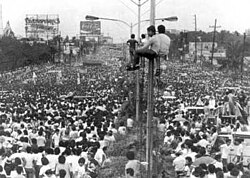
Ong Tee Keat was one of the few high-level Chinese politicians who agreed that Malaysian Chinese are marginalised by Umno, according to a secret US diplomatic cable in 2006 published today at Malaysia Today through WikiLeaks.
The US Embassy’s political officer, Mark Clark, noted that Ong, then MCA vice-president, was one of the few ministerial level Chinese politicians who refused to deny publicly or privately the fact that Chinese Malaysians are marginalised.
Ong commented to Clark in a private meeting that although Chinese leaders from MCA and Gerakan were bound to support government (i.e. Umno) positions, their Chinese constituents were not satisfied with their responses.
In cases such as this, “silence is sometimes our only valid response.” But he acknowledged, “of course we are marginalised, big business to small stall owners know that — but MCA cannot admit it.”
So when pressed by reporters for a public response to Singapore leader Lee Kuan Yew’s accusation that year that Malaysia marginalises the Chinese community, Ong related an old Chinese proverb — “Whether the water in the tea cup is hot or cold, he who drinks it knows best,” the cable said.
Ong Tee Keat foresaw the difficulties facing the MCA in the general election (held two years later, in 2008). There was great dissatisfaction with the status quo in the Chinese community, only partially shown in the Sarawak elections of 2006 when the DAP won six seats.
“Sarawak was a wake-up call for all Chinese parties,” Ong told the US diplomat. The MCA and Gerakan were not sure they could counter the growing discontent in their communities. The Chinese component parties of BN no longer have community focused development projects to show their constituents, as these have all been redirected to Malay communities.
“There was once a day in Malaysia when MCA would get the left-overs, but now we are just hoping to get some crumbs from the Umno table,” said Ong; an example was in the Ninth Malaysia Plan which called for 180 new schools to be built but none of which would be Chinese or Tamil vernacular schools.
Only after loud outcries from the Chinese community did the Ministry of Education “cave in” and announce that two of the 180 schools would be designated as Chinese vernacular schools. Again, MCA could not provide a proportional voice for the Chinese minority, and Ong believed the community took note, the cable said.
[Source: Uppercaise]
From left overs to crumbs? Now I know how it feels to beg, and they are still wondering why the commnuity has stopped voting them into office. Where is the sense of pride and dignity? *sigh*

 The 11, who said they represented several Malay NGOs, first stomped on the papers, calling them “paper haram” (illegal) and “berita palsu” (false news). [HMMM, I THOUGHT THIS WOULD HAVE BEEN MORE APPROPRIATE IF ONE WAS TO DESCRIBE THE UTUSAN OR BERITA HARIAN IN THIS MANNER. GIVING THE STAR THE BENEFIT OF A DOUBT, IT WAS MERELY AN PROMOTIONAL ADVERTISEMENT NOT A POLITICAL SPIN. SINCE THE PAPER HAVE ALREADY APOLOGISED TWICE, WHY CONTINUE TO FLOG THE HORSE? UTUSAN, ON THE OTHER HAND HAVE BEEN SPINNING STORIES, YOU KNOW 'BERITA PALSU' THAT WOULD HAVE CREATED SOCIAL INSTABILITY. EVEN WHEN THEY WERE CAUGHT WITH FALSE REPORTING, THEY DIDN'T EVEN HAVE THE COURTESY TO APOLOGISE, AND WE KNOW WHY.]
The 11, who said they represented several Malay NGOs, first stomped on the papers, calling them “paper haram” (illegal) and “berita palsu” (false news). [HMMM, I THOUGHT THIS WOULD HAVE BEEN MORE APPROPRIATE IF ONE WAS TO DESCRIBE THE UTUSAN OR BERITA HARIAN IN THIS MANNER. GIVING THE STAR THE BENEFIT OF A DOUBT, IT WAS MERELY AN PROMOTIONAL ADVERTISEMENT NOT A POLITICAL SPIN. SINCE THE PAPER HAVE ALREADY APOLOGISED TWICE, WHY CONTINUE TO FLOG THE HORSE? UTUSAN, ON THE OTHER HAND HAVE BEEN SPINNING STORIES, YOU KNOW 'BERITA PALSU' THAT WOULD HAVE CREATED SOCIAL INSTABILITY. EVEN WHEN THEY WERE CAUGHT WITH FALSE REPORTING, THEY DIDN'T EVEN HAVE THE COURTESY TO APOLOGISE, AND WE KNOW WHY.]

 “Sterner actions should be taken against the newspaper's editor, he should be terminated from his job,” he said.
“Sterner actions should be taken against the newspaper's editor, he should be terminated from his job,” he said. About 50 policemen stood watch while the activity took place in Bayan Lepas, about 1km from the Penang International Airport. [WHY IS IT THAT WHENEVER THESE UMNO RELATED GROUPS PROTEST, THE POLICE HAVE A TENDENCY TO STAND WATCH AND NOT ARREST THE CULPRITS. IF IT WAS THE OPPOSITION, THEY WILL JUMP INTO ACTION AS THOUGH THEY HAVE JUST TAKEN 5 BOTTLES OF LIVITA].
About 50 policemen stood watch while the activity took place in Bayan Lepas, about 1km from the Penang International Airport. [WHY IS IT THAT WHENEVER THESE UMNO RELATED GROUPS PROTEST, THE POLICE HAVE A TENDENCY TO STAND WATCH AND NOT ARREST THE CULPRITS. IF IT WAS THE OPPOSITION, THEY WILL JUMP INTO ACTION AS THOUGH THEY HAVE JUST TAKEN 5 BOTTLES OF LIVITA].
